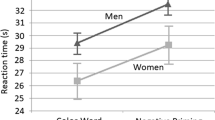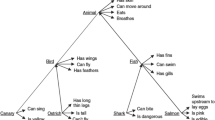Abstract
This study investigated whether working memory capacity could account for individual differences in verbal fluency. Working memory was assessed by the speaking span test (Daneman & Green, 1986) that taxes the processing and storage functions of working memory during sentence production. Verbal fluency was assessed by (1) a speech generation task in which subjects made a speech about a picture; (2) an oral reading task in which subjects read aloud a prose passage; and (3) a Baars, Motley, and MacKay (1975) task for eliciting oral slips of the tongue (e.g.,wet gun forget one). Speking span was significantly correlated with performance on all three tasks; individuals with small speaking spans were less fluent and more prone to making speech errors. Whereas speaking span was related to individual differences in verbal fluency on the speech and reading tasks, reading span, a measure included to assess working memory capacity during sentence comprehension, was only significantly related to individual differences in verbal fluency on the reading task. The methodology proved useful for revealing whether a particular kind of oral reading error reflected a reading failure or an articulatory failure.
Similar content being viewed by others
References
Baars, B. J., Motley, M. T., & MacKay, D. G. (1975). Output editing for lexical status in artificially elicited slips of the tongue.Journal of Verbal Learning and Verbal Behavior, 14, 382–391.
Baddeley, A. D. (1981). The concept of working memory: A review of its current state and probable future development.Cognition, 10, 17–23.
Baddeley, A. D. (1986).Working memory. Oxford, England: Clarendon Press.
Baddeley, A. D., & Hitch, G. J. (1974). Working memory. In G. A. Bower (Ed.)The psychology of learning and motivation (Vol. 8, pp. 47–89). New York: Academic Press.
Baddeley, A. D., Logie, R., Nimmo-Smith, I., & Brereton, N. (1985). Components of fluent reading.Journal of Memory and Language, 24, 119–131.
Baker, L. (1985). Working memory and comprehension: A replication.Bulletin of the Psychonomic Society, 23, 28–30.
Bock, J. K. (1982). Toward a cognitive psychology of syntax: Information processing contributions to sentence formulation.Psychological Review, 89, 1–47.
Carpenter, P. A., & Daneman, M. (1981). Lexical retrieval and error recovery in reading: A model based on eye fixations.Journal of Verbal Learning and Verbal Behavior, 20, 137–160.
Case, R., Kurland, D. M., & Goldberg, J. (1982). Operational efficiency and the growth of short-term memory span.Journal of Experimental Child Psychology, 33, 386–404.
Clark, H. H., & Clark, E. V. (1977).Psychology and language. New York: Harcourt, Brace, Jovanovich.
Daneman, M. (1984). Why some people are better readers than others: A process and storage account In R. J. Sternberg (Ed.),Advances in the psychology of human intelligence (Vol. 2, pp. 367–384). Hillsdale, NJ: Erlbaum.
Daneman, M., & Carpenter, P. A. (1980). Individual differences in working memory and reading.Journal of Verbal Learning and Verbal Behavior, 19, 450–466.
Daneman, M., & Carpenter, P. A. (1983). Individual differences in integrating information between and within sentences.Journal of Experimental Psychology: Learning, Memory, and Cognition, 9, 561–583.
Daneman, M., & Green, I. (1986). Individual differences in comprehending and producing words in context.Journal of Memory and Language, 25, 1–18.
Danks, J. H., & Fears, R. (1979). Oral reading: Does it reflect decoding or comprehension? In L. B. Resnick & P. A. Weaver (Eds.),Theory and practice of early reading (Vol. 3, pp. 89–108). Hillsdale, NJ: Erlbaum.
Dixon, P., LeFevre, J.-A., & Twilley, L. C. (1988). Word knowledge and working memory as predictors of reading skill.Journal of Educational Psychology, 80, 465–472.
Fillmore, C. J. (1979). On fluency. In C. J. Fillmore, D. Kempler, & W. S. Y. Wang (Eds.),Individual differences in language ability and language behavior (pp. 85–101). New York: Academic Press.
Ford, M., & Holmes, V. M. (1978). Planning units and syntax in sentence production.Cognition, 6, 35–53.
Fromkin, V. A. (1971). The non-anomalous nature of anomalous utterances.Language, 47, 27–52.
Fromkin, V. (1973).Speech errors as linguistic evidence. The Hague: Mouton Publishers.
Garrett, M. F. (1975). The analysis of sentence production. In G. H. Bower (Ed.),The psychology of learning and motivation (Vol. 9, pp. 133–177). New York: Academic Press.
Garrett, M. F. (1980). The limits of accommodation. In V. A. Fromkin (Ed.),Errors in linguistic performance (pp. 263–271). New York: Academic Press.
Goldman-Eisler, F. (1968).Psycholinguistics: Experiments in spontaneous speech. New York: Academic Press.
Heath, S. B. (1983).Ways with words. New York: Cambridge University Press.
Hunt, E. B. (1978). Mechanics of verbal ability.Psychological Review, 85, 109–130.
Hunt, E. B., Lunneborg, C., & Lewis, J. (1975). What does it mean to be high verbal?Cognitive Psychology, 2, 194–227.
Maccoby, E. E., & Jacklin, C. N. (1974).The psychology of sex differences. Stanford, CA: Stanford University Press.
Maclay, H., & Osgood, C. E. (1959). Hesitation phenomena in spontaneous English speech.Word, 15, 19–44.
Masson, M., & Miller, J. A. (1983). Working memory and individual differences in comprehension and memory of text.Journal of Educational Psychology, 31, 314–318.
Motley, M. T. (1986). On replicating the slip technique: A reply to Sinsabaugh and Fox.Communication Monographs, 53, 342–351.
Motley, M. T., & Baars, B. J. (1976). Laboratory induction of verbal slips: A new method for psycholinguistic research.Communication Quarterly,24, 28–34.
Motley, M. T., Baars, B. J. & Camden, C. T. (1981). Syntactic criteria in prearticulatory editing: Evidence from laboratory-induced slips of the tongue.Journal of Psycholinguistic Research, 10, 503–522.
Motley, M. T., Baars, B. J., & Camden, C. T. (1983). Experimental verbal slip studies: A review and an editing model of language encoding.Communication Monographs, 50, 79–101.
Perfetti, C. A. (1985).Reading ability. New York: Oxford University Press.
Perfetti, C. A., & Lesgold, A. M. (1977). Discourse comprehension and sources of individual differences. In M. A. Just & P. A. Carpenter (Eds.),Cognitive processes in comprehension (pp. 141–183). Hillsdale, NJ: Erlbaum.
Power, M. J. (1985). Sentence production and working memory.Quarterly Journal of Experimental Psychology, 37A, 367–385.
Power, M. J. (1986). A technique for measuring processing load during speech production.Journal of Psycholinguistic Research, 15, 371–382.
Sincoff, J. B., & Sternberg, R. J. (1987). Two faces of verbal ability.Intelligence, 11, 263–276.
Sternberg, R. J. (1987). The psychology of verbal comprehension. In R. Glaser (Ed.),Advances in instructional psychology (Vol. 3, 4th ed., pp. 341–419). New York: Wiley.
Sternberg, R. J., & Powell, J. S. (1983). Comprehending verbal comprehension.American Psychologist, 38, 878–893.
Tannenbaum, P. H., Williams, F., & Hillier, C. S. (1965). Word predictability in the environments of hesitations.Journal of Verbal Learning and Verbal Behavior, 4, 134–140.
Tapasak, R. C., Roodin, P. A., & Vaught, G. M. (1978). Effects of extraversion, anxiety, and sex on children's verbal fluency and coding task performance.Journal of Psychology, 100, 49–55.
Author information
Authors and Affiliations
Additional information
This research was supported by a grant from the Natural Sciences and Engineering Research Council of Canada.
Rights and permissions
About this article
Cite this article
Daneman, M. Working memory as a predictor of verbal fluency. J Psycholinguist Res 20, 445–464 (1991). https://doi.org/10.1007/BF01067637
Accepted:
Issue Date:
DOI: https://doi.org/10.1007/BF01067637




